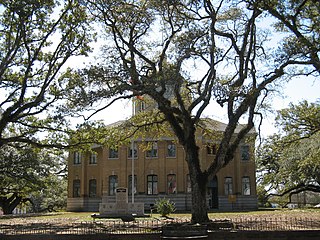
Wilkinson County is a county located in the southwest corner of the U.S. state of Mississippi. As of 2020, its population was 8,587. Its county seat is Woodville. Bordered by the Mississippi River on the west, the county is named for James Wilkinson, a Revolutionary War military leader and first governor of the Louisiana Territory after its acquisition by the United States in 1803.
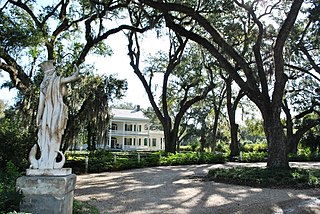
West Feliciana Parish is a civil parish located in the U.S. state of Louisiana. At the 2020 census, the population was 15,310. The parish seat is St. Francisville. The parish was established in 1824.

East Feliciana Parish is a parish located in the U.S. state of Louisiana. At the 2020 census, the population was 19,531. The parish seat is Clinton.

Clinton is a town in, and the parish seat of, East Feliciana Parish, Louisiana, United States. The town was named for New York Governor DeWitt Clinton. The population was 1,653 at the 2010 census. It is part of the Baton Rouge Metropolitan Statistical Area.

St. Francisville is a town in and the parish seat of, West Feliciana Parish, Louisiana, United States. The population was 1,765 at the 2010 U.S. census, and 1,589 at the 2020 population estimates program. It is part of the Baton Rouge metropolitan statistical area.
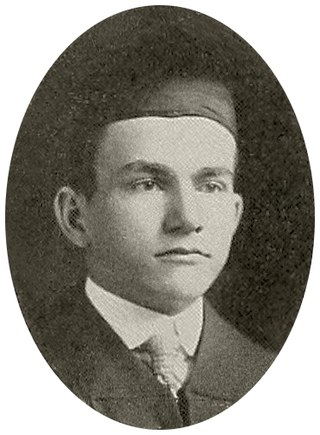
Leander Henry Perez Sr. was an American Democratic Party political boss of Plaquemines and St. Bernard parishes in southeastern Louisiana during the middle third of the 20th century. Officially, he served as a district judge, later as district attorney, and as president of the Plaquemines Parish Commission Council. He was known for leading efforts to enforce and preserve segregation.

Jackson Academy is a private school in Jackson, Mississippi founded by Loyal M. Bearrs in 1959. Bearrs claimed he established the school to teach using an accelerated phonics program he developed, but the school remained completely racially segregated until 1986, even forgoing tax exemption in 1970 to avoid having to accept Black students.

Segregation academies are private schools in the Southern United States that were founded in the mid-20th century by white parents to avoid having their children attend desegregated public schools. They were founded between 1954, when the U.S. Supreme Court ruled that segregated public schools were unconstitutional, and 1976, when the court ruled similarly about private schools.

False River Academy is a nonsectarian private school located in New Roads, Louisiana, in Pointe Coupee Parish. It serves grades Pre-K through 12. The school is independent, and has its own school board. Its enrollment is drawn from Pointe Coupee and surrounding parishes. It is one of two private schools and one of three high schools in the parish.
The Midsouth Association of Independent Schools (MAIS) is a consortium of schools in Mississippi, Tennessee, Louisiana and Arkansas. It is responsible for accreditation of its member private schools as well as governing athletic competition for its member schools. It was founded in 1968 by a group of segregation academies.
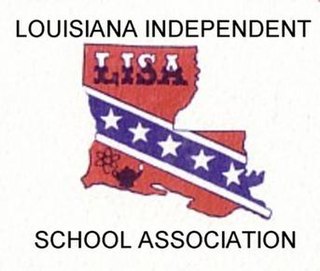
The Louisiana Independent School Association (1970–1992), more commonly known as LISA, was an athletic association created to offer interscholastic sports at all-white segregation academies in the state of Louisiana. The organization is no longer in existence.
Gurley is an unincorporated community in East Feliciana Parish, Louisiana, United States, on Louisiana Highway 963. Gurley is located ten miles from the state of Mississippi.
Bayou Academy is a non-profit school located in unincorporated Bolivar County, Mississippi, near the City of Cleveland on Highway 8. The school serves about 500 students in grades Pre-Kindergarten through 12. The school is accredited by the Midsouth Association of Independent Schools.

Claiborne Academy is a private, non-profit, pre-kindergarten through 12th grade school located in unincorporated Claiborne Parish, Louisiana, between Haynesville and Homer. It was founded in 1969 as a segregation academy. Their nickname is the Rebels, the school newspaper is the Rebel Yell, and their school symbol is the Confederate battle flag.
Tunica Academy is a K-12 non-denominational Christian private school located in unincorporated Tunica County, Mississippi, near Tunica. The school was founded in 1964 and has been described as a segregation academy. Tunica Academy is an accredited member of the Mississippi Private School Association.
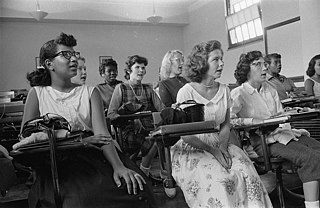
In the United States, school integration is the process of ending race-based segregation within American public and private schools. Racial segregation in schools existed throughout most of American history and remains an issue in contemporary education. During the Civil Rights Movement school integration became a priority, but since then de facto segregation has again become prevalent.
Wilkinson County Christian Academy is a private PK3-12 Christian school in Wilkinson County, Mississippi, near Woodville. It was established in 1969 as a segregation academy.

Calhoun Academy (CA) is a private school in Pittsboro, Mississippi, founded in 1968 as a segregation academy.
The Mississippi Red Clay region was a center of education segregation. Before the Brown v. Board of Education decision in 1954, Mississippi sponsored freedom of choice policies that effectively segregated schools. After Brown, the effort was private with some help from government. Government support has dwindled in every decade since. In the state capital, Jackson, some public schools were converted to white-only Council schools. Today, some all-white and mostly-white private schools remain throughout the region as a legacy of that period.
Centreville Academy is a private PK-12 school in Centreville, Mississippi. It serves 357 students from Amite County and adjacent Wilkinson County.





















